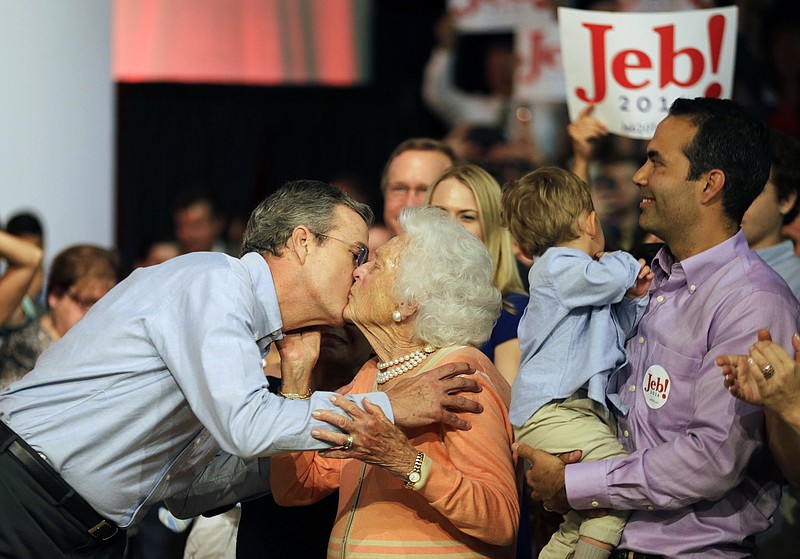John Ellis Bush offered up his official Isaiah moment to the 2016 Republican presidential primary electorate Monday: Here I am. Send me.
The candidate, more commonly known as Jeb, has been at or near the top of all primary polls since he said in December he was actively exploring the race.
Bush brings with him an actual record of accomplishment from two terms as governor of Florida: in his own words, "number one in job creation and number one in small business creation, 1.3 million new jobs, 4.4 percent growth, higher family income, eight balanced budgets and tax cuts eight years in a row that saved our people and businesses 19 billion dollars."
He brings to the race the ability to raise money nationally - his campaign is hoping for $100 million in the first quarter - and pull in the most talented and experienced of campaign staffs.
Bush's campaign introductory speech in Miami called for 4 percent in annual economic growth that would translate into 19 million jobs. Conservative economists believe that kind of growth is possible without the brakes the Obama administration has kept on the economy, though it would be a stretch since the last time yearly inflation-adjusted growth in the nation's gross domestic product topped that percentage was 2000, but it's gratifying to hear a presidential candidate believe such growth is still possible.
As a governor, he also slashed the number of state employees, privatized some public functions, fought what he believed were burdensome regulations, and supported gun rights and school vouchers.
Bush's speech also included an appeal of compassion for the less fortunate, appeals his presidential father and brother also made and fulfilled in different ways but received little credit for.
"My core beliefs start with the premise that the most vulnerable in our society should be in the front of the line and not the back," he said. "What we need is new leadership that takes conservative principles and applies them so that people can rise up."
That's the right approach. His follow-through is what would spell success or failure. And he at least knows the current method of wealth transfer - under Obama - has been a dismal failure.
Bush said he'll also campaign in places Republican candidates before him have not - Hispanic neighborhoods (he's fluent in Spanish), black churches and college campuses.
That's also the right thing to do. If he doesn't campaign there and honestly tell them where Democratic policies have led them, who will? He'll be flayed by Big Media for pandering if he does so, but Democrats certainly won't tell them.
"They (Obama, Clinton and others) have offered a progressive agenda," Bush said, "that includes everything but progress."
That's all on the upside for Bush - that and the likelihood he would face one of the most flawed Democratic candidates in modern history.
But there's also downsides, ones that will be difficult to overcome.
One is Bush's dogged support for immigration reform. Americans who once may have supported the concept have seen the horribly porous Southern border, the lack of oversight of illegal immigrants by the Obama administration and the increasing price the country is paying. The issue is not likely to be a campaign plus among most Republicans and even some Democratic voters.
Another is his support for Common Core education reforms. Rather than pushing increased standards for all states - and chosen by the state as in the reform package put forth by Sen. Lamar Alexander, R-Tenn. - he has stuck to one set of raised standards, one the White House has used to manipulate states in the last several years.
"I'm not going to change who I am," Bush said last weekend. "I respect people who may not agree with me, but I'm not going to change my views because today someone has a view that's different."
A third, and perhaps deadly, albatross is his status as the brother of former President George W. Bush. Though years have mellowed some voters - and the 43rd president was found to be more popular than the current president in a recent poll - many will still hang "W's" war legacy and late-term economic downturn around his brother's neck.
It's unfair, of course, but it's there and unlikely to go away by November 2016.
Voters deserve better than an election pitting the scandal-ridden Hillary Clinton against the taking-lumps-for-his-brother Jeb Bush. Bush is easily the better candidate but may not be the best the Republicans have to offer.
